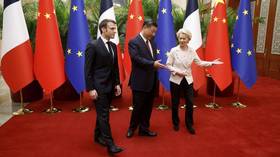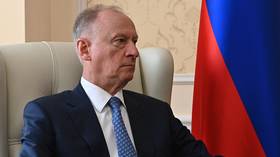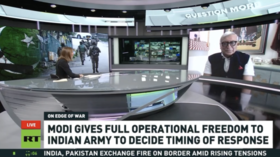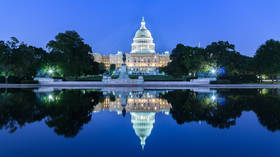Macron refuses to back US line on China
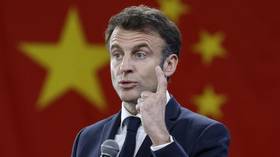
Western Europe must pursue “strategic autonomy” and avoid getting dragged into confrontations on behalf of the US, Emmanuel Macron told Politico on Sunday. The French president has made similar assertions before, but has nevertheless followed Washington’s lead on Ukraine.
In an interview while traveling within China this week, Macron told the news site that “Europe faces a great risk” if it “gets caught up in crises that are not ours.”
“The paradox would be that, overcome with panic, we believe we are just America’s followers,” Macron said. “The question Europeans need to answer… is it in our interest to accelerate [a crisis] on Taiwan? No. The worse thing would be to think that we Europeans must become followers on this topic and take our cue from the US agenda and a Chinese overreaction.”
Macron met with Chinese President Xi Jinping prior to the interview, concluding afterwards that if “Europeans cannot resolve the crisis in Ukraine, how can we credibly say on Taiwan: ‘watch out, if you do something wrong we will be there’?”
Hours after Macron left Chinese airspace, Beijing launched military exercises around Taiwan, a move widely perceived as a response to the island’s pro-independence leader Tsai Ing-Wen holding a meeting with US lawmakers in California on Wednesday.
Relations between China and the US are at an historic low point, with US President Joe Biden suggesting on several occasions last year that Washington would intervene militarily to prevent Beijing reunifying Taiwan with the mainland. While world leaders including Macron are seemingly content to stay out of the Taiwan standoff, their insistence on pushing China to denounce Russia over its military operation in Ukraine has angered Xi, according to media reports and comments from Chinese officials.
The conflict in Ukraine has also largely scuppered discussions of “strategic autonomy” in Europe. While Macron and former German Chancellor Angela Merkel had talked extensively about lessening their reliance on the US in recent years, a change in power in Berlin saw Olaf Scholz’ government reverse decades of pacifist foreign policy to arm Ukraine at Washington’s behest, while both France and Germany have supplied armored vehicles, ammunition, and in Germany’s case, tanks, to Kiev’s forces.
With rising energy costs and inflation contributing to domestic instability, Macron has nevertheless backed all 10 of the EU’s anti-Russian sanctions packages. Despite speaking to Russian President Vladimir Putin on several occasions since last February, Macron has not managed to push the Kremlin toward halting its operation in Ukraine.
The French president “is still talking about the strategic independence of the EU,” Russian Foreign Minister Sergey Lavrov remarked last summer, adding “I am certain they will not be allowed to have it.”
